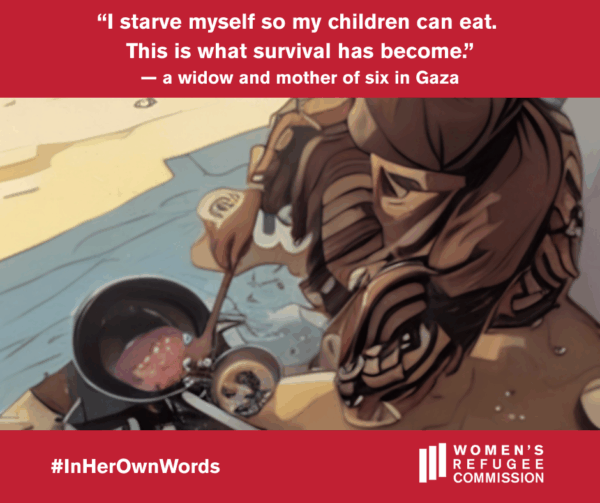“Most days we eat once, sometimes not at all. My younger children cry through the night and I have no answer for them. We have no gas or electricity, so I cook over scraps of wood or cardboard in old tins. The smoke makes us cough and sick, but there is no other way. I have grown frail and malnourished. I starve myself so my children can eat. This is what survival has become. The children are traumatized. They no longer ask about school, they only ask if they will eat tomorrow. Every attempt to get food feels like another wound. Recently I walked for hours to reach an aid distribution point. There were thousands of desperate people, crying and pushing while soldiers fired in the air. When I finally reached the front, everything was gone. I came back to my children empty-handed. My dreams are not complicated. I want my children to be safe, to eat until they are full, to return to their studies, and to grow up with dignity.”
These are the words of a woman in Gaza—a nurse, widow, and mother of six doing everything she can to keep herself and her children alive in the famine, while under constant siege. Like every woman in Gaza, she has experienced countless traumas since the war began. One of her children was shot and killed by Israeli soldiers right in front of her. Despite her grief and trauma, she continues to struggle to find food to keep herself and her five surviving children fed. This is the impossible context in which women in Gaza are living and fighting for life.
This woman shared her story with WRC researchers for an upcoming report documenting the gendered impacts of food insecurity and famine in Gaza. In addition to first-person testimonies from eight women in Gaza, the report shares research findings and recommendations for governments, international bodies, and humanitarian actors. The women and girls of Gaza urgently need a ceasefire and humanitarian relief.
We will share the report with you in the coming days. The stories are difficult to read, but we all must bear witness to the experiences of women in Gaza who have lived through nearly two years of siege and starvation.
We will also be sharing more first-person accounts, on our website and social media channels. We created this new series, “In Her Own Words,” to bring the stories of women living in the world’s most extreme conflict zones into focus and to the forefront of public awareness about who bears the real costs of war and displacement.
For 36 years, WRC has listened to women living through conflict and displacement and advocated for their rights and safety. We invite you to join us. Scroll down to our website footer to subscribe to our email list and get updates about our work.


